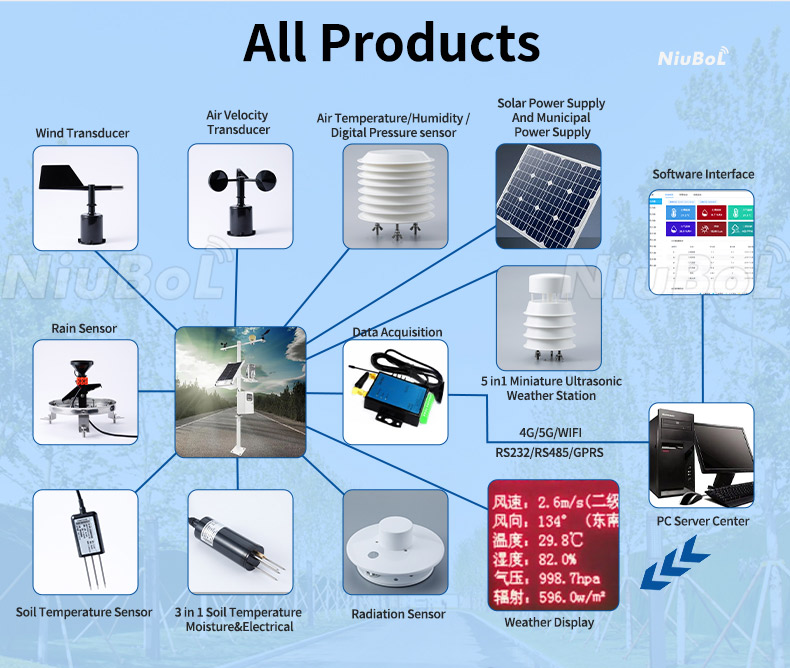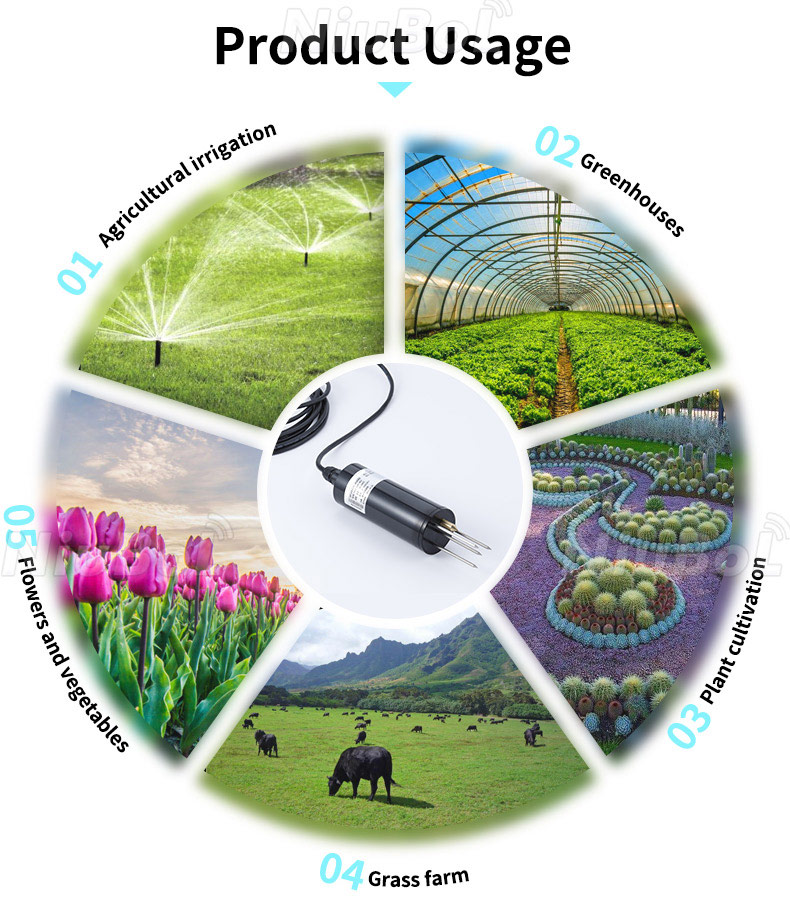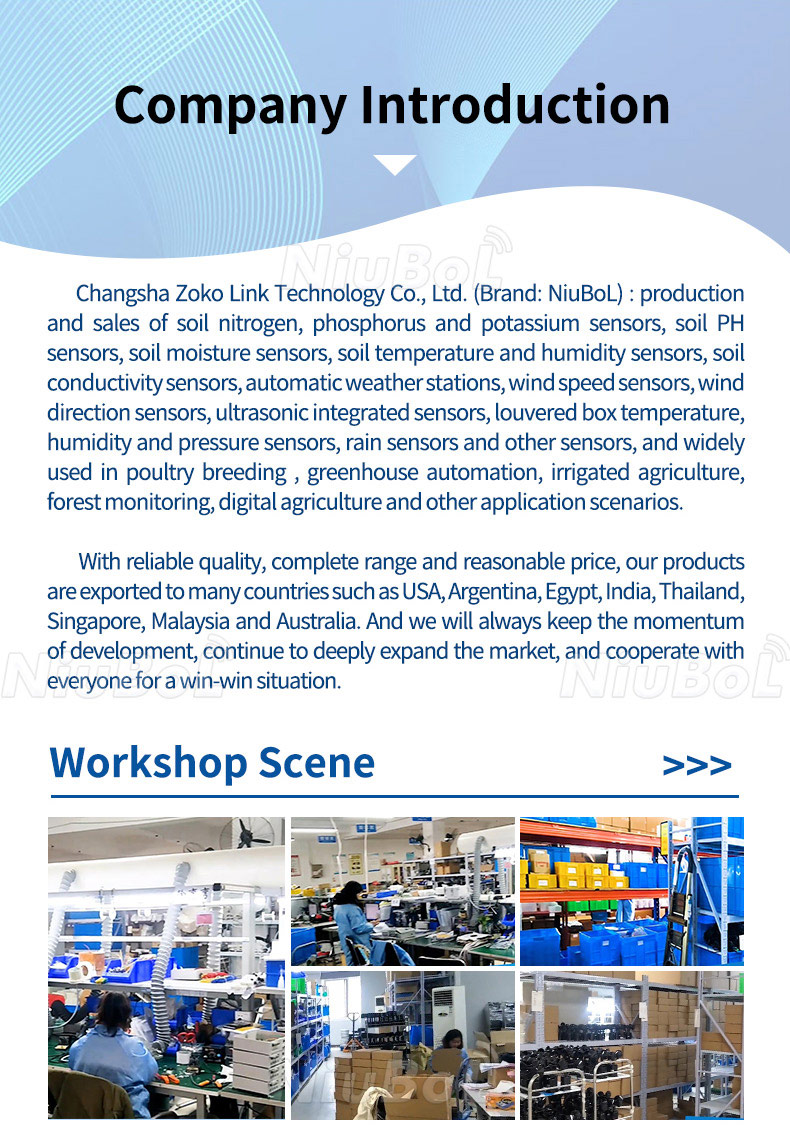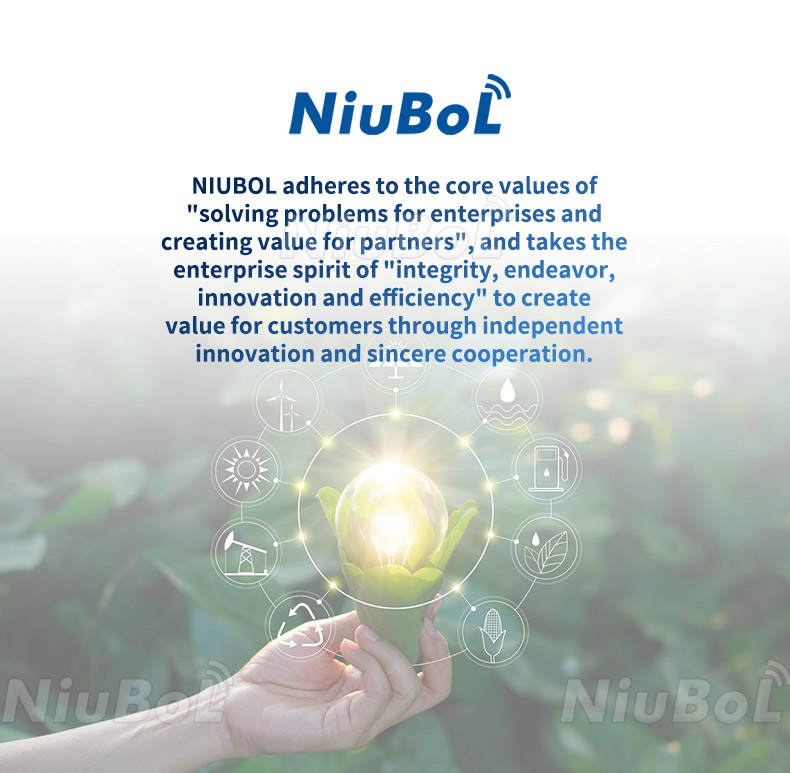

— Products —
 Consumer hotline +8618073152920
Consumer hotline +8618073152920 WhatsApp:+8615367865107
Address:Room 102, District D, Houhu Industrial Park, Yuelu District, Changsha City, Hunan Province, China
All products
soil moisture sensor is a sensor used to measure the amount of water in the soil, which monitors the moisture content of the soil to help farmers determine whether irrigation is needed. By monitoring the soil moisture sensor, the farmer can understand the moisture condition in the soil and decide whether irrigation is needed based on the needs of the crop and the moisture content of the soil to maintain the soil moisture required for proper crop growth.
Tel/WhatsApp:+8615367865107
Email:Arvin@niubol.com +Nearly 100 partner company in more than 68 countries. We are committed to providing high-quality, practical products to meet your needs and help you solve problems.Product Details











A soil moisture sensor is a sensor used to measure the amount of water in the soil, which monitors the moisture content of the soil to help farmers determine whether irrigation is needed. By monitoring the soil moisture sensor, the farmer can understand the moisture condition in the soil and decide whether irrigation is needed based on the needs of the crop and the moisture content of the soil to maintain the soil moisture required for proper crop growth.
Generally, soil moisture sensors measure the moisture content in the soil and convert it into an electrical or digital signal output. Farmers can use the sensor's output signal to determine whether irrigation is needed and how much. Some modern soil moisture sensors also have a variety of measurement functions, such as temperature, PH value, EC value, etc., which can help farmers have a more comprehensive understanding of soil conditions.
Soil moisture sensors are an essential tool for irrigation management in agriculture. In addition to soil moisture sensors, smart irrigation systems include other components such as water sources, pumps, pipes, and sprinklers.
By connecting these components to the sensor, farmers can build a smart irrigation system for automated irrigation management. When the soil moisture is below a certain threshold, the system will automatically turn on the water pump and sprinkler head to replenish the soil; when the soil moisture reaches a certain value, the system will automatically turn off the water pump and sprinkler head to stop irrigation. They help farmers determine the water content in the soil and optimize irrigation practices accordingly.

1. Accurate measurement: Soil moisture sensors provide real-time data on the moisture levels within the soil. They accurately measure the water content at different depths, allowing farmers to understand the moisture distribution in their fields.
2. Irrigation scheduling: By monitoring soil moisture levels, farmers can develop precise irrigation schedules based on the actual water needs of their crops. Instead of relying solely on a fixed irrigation timetable, they can adjust the irrigation frequency and duration according to the moisture readings from the sensors.
3. Preventing over-irrigation: Over-irrigation can lead to water wastage, leaching of nutrients, and even waterlogging, which can negatively impact crop growth. Soil moisture sensors help farmers avoid over-irrigation by indicating when the soil has sufficient moisture, preventing unnecessary watering.
4. Preventing under-irrigation: Insufficient irrigation can result in water stress for plants, affecting their growth and yield. Soil moisture sensors alert farmers when the soil moisture drops below a certain threshold, signaling the need for irrigation to ensure optimal plant health and productivity.
5. Water conservation: By providing accurate and timely information on soil moisture, these sensors enable farmers to apply water precisely where and when it is needed. This helps conserve water resources by avoiding excessive irrigation and reducing water runoff.
6. Optimizing fertilizer application: Soil moisture sensors can also aid in optimizing fertilizer application. By measuring the soil moisture levels, farmers can determine the appropriate timing and dosage of fertilizers, ensuring that nutrients are applied when the soil can effectively absorb them.
Overall, soil moisture sensors play a vital role in irrigation management by allowing farmers to make data-driven decisions regarding irrigation scheduling, reducing water waste, and optimizing crop yield while conserving resources. They help ensure that crops receive the right amount of water at the right time, promoting efficient and sustainable agricultural practices.
Sensors & Weather Stations Catalog
Agriculture Sensors and Weather Stations Catalog-NiuBoL.pdf
Weather Stations Catalog-NiuBoL.pdf
Related recommendations
 Multi-Depth Soil Sensor RS485
Multi-Depth Soil Sensor RS485 TDR Soil Moisture Sensor
TDR Soil Moisture Sensor Pyranometer Solar Radiation Sensors
Pyranometer Solar Radiation Sensors Soil ph sensor
Soil ph sensor Tipping Bucket Rain Gauge
Tipping Bucket Rain Gauge Air Temperature and Humidity Sensor
Air Temperature and Humidity Sensor
Screenshot, WhatsApp to identify the QR code
WhatsApp number:+8615367865107
(Click on WhatsApp to copy and add friends)